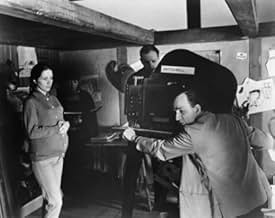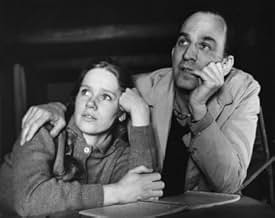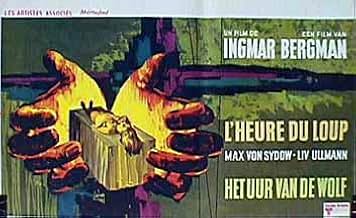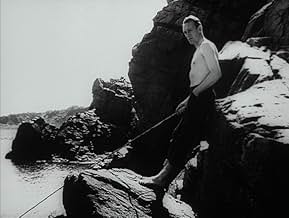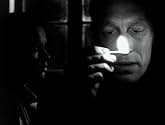CALIFICACIÓN DE IMDb
7.5/10
24 k
TU CALIFICACIÓN
Un artista que pasa sus vacaciones en una remota isla escandinava junto a su joven esposa embarazada sufre una crisis emocional al tratar de enfrentarse a sus deseos reprimidos.Un artista que pasa sus vacaciones en una remota isla escandinava junto a su joven esposa embarazada sufre una crisis emocional al tratar de enfrentarse a sus deseos reprimidos.Un artista que pasa sus vacaciones en una remota isla escandinava junto a su joven esposa embarazada sufre una crisis emocional al tratar de enfrentarse a sus deseos reprimidos.
- Dirección
- Guionista
- Elenco
- Premios
- 2 premios ganados en total
Agda Helin
- von Merken's Maid
- (sin créditos)
Lenn Hjortzberg
- Kreisler
- (sin créditos)
Mikael Rundquist
- Boy in Dream
- (sin créditos)
Folke Sundquist
- Tamino
- (sin créditos)
- Dirección
- Guionista
- Todo el elenco y el equipo
- Producción, taquilla y más en IMDbPro
Opiniones destacadas
Much like F.W. Murnau, or even David Lynch for that matter, Ingmar Bergman can create horror in a film, such as his rarity in the genre of Hour of the Wolf (no, no werewolves boys and girls, the title refers to something else entirely regarding the middle of the night), by imposing images that are so unbelievable as to either frighten or annoy. Bergman is no stranger to the surreal (Persona his most notorious feat, but surrealism lurks in many Bergman works), and Hour of the Wolf displays his skills at it with a precision that is un-canny. We're given a couple of characters thrust (not entirely by accident) into a strange atmosphere of people, locations, shadows, the night. And with this film, the audience is given images and scenes that are very new, even for a modern audience, but most of the film brings one back to the most chilling of the silent-film horror classics. But that's not to say this is a relatively accessible Bergman film, unless you are very much into the genre.
Max Von Sydow and Liv Ullman give strong performances as a couple (one an artist the other his pregnant wife) who arrive on an island to have some peace, where he can get some work done. But this is not the case as Von Sydow's character goes through a kind of deconstruction in the night- he can't sleep, he's shaken to intense uncomfort by neighbors, and a particular memory haunts him all the time (and once Bergman shows what it is, it becomes one of the most horrifying scenes I may have ever seen). If there is a climax to the film it's difficult to discern- the only flaw I had with the film, that sometimes it's almost TOO bizarre- however what leads up to it is a skillful work at experimental theatricality. Everything seems real enough to draw the audience in, and everything seems un-real enough for the audience to be disconnected enough to understand the surreal nature. To put it another way, it's a good film to scare the hell out of you as a midnight movie.
Max Von Sydow and Liv Ullman give strong performances as a couple (one an artist the other his pregnant wife) who arrive on an island to have some peace, where he can get some work done. But this is not the case as Von Sydow's character goes through a kind of deconstruction in the night- he can't sleep, he's shaken to intense uncomfort by neighbors, and a particular memory haunts him all the time (and once Bergman shows what it is, it becomes one of the most horrifying scenes I may have ever seen). If there is a climax to the film it's difficult to discern- the only flaw I had with the film, that sometimes it's almost TOO bizarre- however what leads up to it is a skillful work at experimental theatricality. Everything seems real enough to draw the audience in, and everything seems un-real enough for the audience to be disconnected enough to understand the surreal nature. To put it another way, it's a good film to scare the hell out of you as a midnight movie.
a lot of even of the most loyal bergman fans claim that they came away from this one confused and irritated, and found it lacking in meaningful symbolism. i wonder if they watched the same movie i did?? this is just about one of the most intriguing, imaginative horror movies i've ever seen, and it is indispensable for those who enjoy the occasional dip into the proverbial pool of cinematic madness and mental derangement. i'm not in uncritical praise of everything bergman made, and some of his movies are admittedly a bit heavy handed and depressing, but i see this one as an example of what he could do when he decided to go all out. johann (max von sydow) and alma (liv ullmann)are husband and wife, and sydow's character is basically a tormented artist who has moved to the deceptively serene and quiet island with his wife to collect himself and try to escape his personal demons. to say the least, it doesn't exactly pan out that way. i believe the constant darkness and atmosphere of chaos and fear in the film is a metaphor for the human condition, because when you really reflect on it, we can never tell if the impressions we get and the ideas we have are projections of our imaginations or have some basis in reality, just as johann and his loyal wife cannot tell if these superficially amiable but suspiciously odd people are really there or are illusory creations of his mind. lindhorst, 'the birdman', is a particularly chilling character, and i would venture to say that the scene in which he puts on a puppet show for the couple and the rest of the socialites/demons is the key to the film. lindhorst creates a scene from mozart's "the magic flute", and recites (during a truly haunting close up), the dialogue from a scene crucial to the meaning of the symphony. one of the crucial characters, tamino (and anyone into mozart will understand what i'm talking about)collapses in the *palace of wisdom*, that is, a terrible place where he has discovered the tragic truth about human life and it's meaninglessness, and asks desperately "when will mine eyes the daylight see?" lindhorst is quick to recite the reply:"soon, soon fair youth..or never." he then goes on to talk about how mozart was terminally ill at the time of it's composition, and i would not be surprised if this entire scene was a metaphor for the artists' struggle with the fact of death and it's crushing finality:how can the creative individual, more sensitive to the issue of ultimate meaning as regards the human condition, be content or happy with anything when he knows that the world just might be and probably is what thomas carlyle called it, "an uncaring hall of doom"? how can we be sure of our meanings, when they could be wishful projections of our own minds, when the beliefs we have about ourselves and others cannot be purely objective or subjective? if this is the case, don't we necessarily live in a shadow house of illusions and absurdities? anyone with half a brain can see that there IS existential symbolism in this film. rich, unbearably tense, masterful horror and surrealism at it's finest. buy it.
Our early encounters with Johan Borg, played by the enigmatic, Max von Sydow do not encourage our sympathy. The painter seems troubled but boorish with it and something of a bully. Liv Ullmann is wonderful as his long suffering wife, Alma, and really tries to help her husband overcome his illness. This is the reason they are on the (deserted?) island, to give him a chance to overcome his demons. And what demons! For the first half of the film we are about as bemused as Alma as to what is going on with all the various encounters, but as the film progresses we are drawn in further, as is she. The artist overcome by his own creative imaginings or a sick man struggling with his nightmares? Can one tell the difference in the end? As the two main characters finally fall in together, dragging us with them a full blown Gothic melodrama opens up and almost engulfs us all. Most original and horrifying work. I don't know if it was just me but I had to play this with 'hard of hearing' English as I could find no other English track on the DVD.
a man moves to a remote island with his wife. he cannot sleep at night and is tormented by inner demons. the film tracks this madness of his. excellent performances by max snydow and liv ullman. the cinematography is beautiful and precise. as is usual with bergman's films, it is not clear on first viewing what the movie is all about. why the man is tormented, is a mystery, at least to me.
"Hour of the Wolf" (1968) is one of my favorite Bergman's films. I place it close to "Persona" to which it is a perfect matching piece. This impressive and disturbing movie about the loss of sanity by a tormented artist is another magnificent work of Ingmar Bergman, the closest to the horror genre he ever directed with his regular actors, Max von Sydow who is amazing as Johan and his Muse Liv Ullmann who is equally compelling as Alma, Jonah's wife. The film takes place on an isolated, windy island where Johan and pregnant Alma moved in hope for Johan to work on his paintings and where he is haunted by nightmares from the past that may or may not be just his dreams. They come to torture him during The Hour of the Wolf which Bergman describes as "the hour between night and dawn. It is the hour when most people die, when sleep is deepest, when nightmares are more real. It is the hour when the sleepless are haunted by their deepest fear, when ghosts and demons are most powerful. The Hour of the Wolf is also the hour when most children are born."
Bergman has always been obsessed and fascinated by the inner demons that imagination can create and like no other filmmaker has explored the deepest mysteries of human soul and mind.
Surrealistic, Gothic and dark horror film, with its magnificent black and white cinematography provided by Bergman's long time friend and collaborator, Sven Nykvist, "The Hour of the Wolf" is a frightening view of the mind of a mad person.
It's been mentioned in more than one comment and I agree that David Lynch might have seen "Hour of the Wolf" more than once and was influenced by it when working on his own dark and surrealistic "Erazerhead".
9.5/10
Bergman has always been obsessed and fascinated by the inner demons that imagination can create and like no other filmmaker has explored the deepest mysteries of human soul and mind.
Surrealistic, Gothic and dark horror film, with its magnificent black and white cinematography provided by Bergman's long time friend and collaborator, Sven Nykvist, "The Hour of the Wolf" is a frightening view of the mind of a mad person.
It's been mentioned in more than one comment and I agree that David Lynch might have seen "Hour of the Wolf" more than once and was influenced by it when working on his own dark and surrealistic "Erazerhead".
9.5/10
¿Sabías que…?
- TriviaBergman defines "The Hour of the Wolf" as "The time between midnight and dawn when most people die, when sleep is deepest, when nightmares are most palatable. It is the hour when the sleepless are pursued by their sharpest anxieties, when ghosts and demons hold sway. The hour of the wolf is also the hour when most children are born." According to "Films in Review" critic Henry Hart in the U.S. it's about 4 a.m. when the body's resistance is least.
- Versiones alternativasThere exists an earlier version of the film with an additional, meta-cinematic framing device. In the prologue (lasting about 7 minutes), Bergman is seen on the set directing his actors. The epilogue (lasting about 1 minute) shows us the set being torn down and the crew leaving. These sequences are the only differences to the commonly seen version. Bergman has stated in an interview that he cut off these sequences himself before the general release of the film, as he came to the conclusion that they were just "self-deception". Despite this, a Swedish 35 mm print of the original, longer version does exist, although it's not available on home video in any format.
- ConexionesEdited into 365 days, also known as a Year (2019)
Selecciones populares
Inicia sesión para calificar y agrega a la lista de videos para obtener recomendaciones personalizadas
- How long is Hour of the Wolf?Con tecnología de Alexa
Detalles
- Tiempo de ejecución1 hora 28 minutos
- Color
- Mezcla de sonido
- Relación de aspecto
- 1.37 : 1
Contribuir a esta página
Sugiere una edición o agrega el contenido que falta


